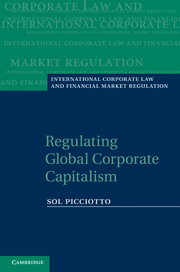Book contents
- Frontmatter
- Contents
- Preface
- Acknowledgements
- Table of cases
- Abbreviations and acronyms
- 1 Transformations of global governance
- 2 Liberal internationalism: strengths and limits
- 3 From interdependence to fragmentation
- 4 Corporations and competition
- 5 Corporate rights and responsibilities
- 6 International taxation
- 7 Regulation of international finance
- 8 The WTO as a node of global governance
- 9 Intellectual property rights
- 10 Law and legitimacy in networked governance
- Bibliography
- Index
2 - Liberal internationalism: strengths and limits
Published online by Cambridge University Press: 05 June 2012
- Frontmatter
- Contents
- Preface
- Acknowledgements
- Table of cases
- Abbreviations and acronyms
- 1 Transformations of global governance
- 2 Liberal internationalism: strengths and limits
- 3 From interdependence to fragmentation
- 4 Corporations and competition
- 5 Corporate rights and responsibilities
- 6 International taxation
- 7 Regulation of international finance
- 8 The WTO as a node of global governance
- 9 Intellectual property rights
- 10 Law and legitimacy in networked governance
- Bibliography
- Index
Summary
The modern nation-state was born and has developed within an international system that can be described as liberal internationalism. However, the social and political pressures outlined in the previous chapter have resulted in a fragmentation of the liberal state, and a transformation of the international state system. In place of centralized government primarily through national-states, within relatively loose forms of international coordination, there has been a shift towards what has been described as multilevel governance. State fragmentation entails the performance of public or state functions by an increasing and bewildering plethora of bodies, public, private and hybrid. It also involves a dual process of decentring of the state: a delegation downwards by central governments to the infra-state level, and a transfer upwards to the international or supra-state level.
Not surprisingly, this has created acute concerns and conflicts, since it is seen as undermining the institutions of liberal democracy based on the nation-state. This has often been cast in terms of the weakening or decline of state sovereignty. However, public authorities in general have been doing more, not less. Indeed, the delegation of many regulatory functions to specialist public bodies relatively independent of central government in many ways results from the increased range and complexity of governance activities. Although the main influences moulding institutional change in each state have been internal, state transformation has been an international process of interrelated responses to global change.
- Type
- Chapter
- Information
- Regulating Global Corporate Capitalism , pp. 25 - 60Publisher: Cambridge University PressPrint publication year: 2011



